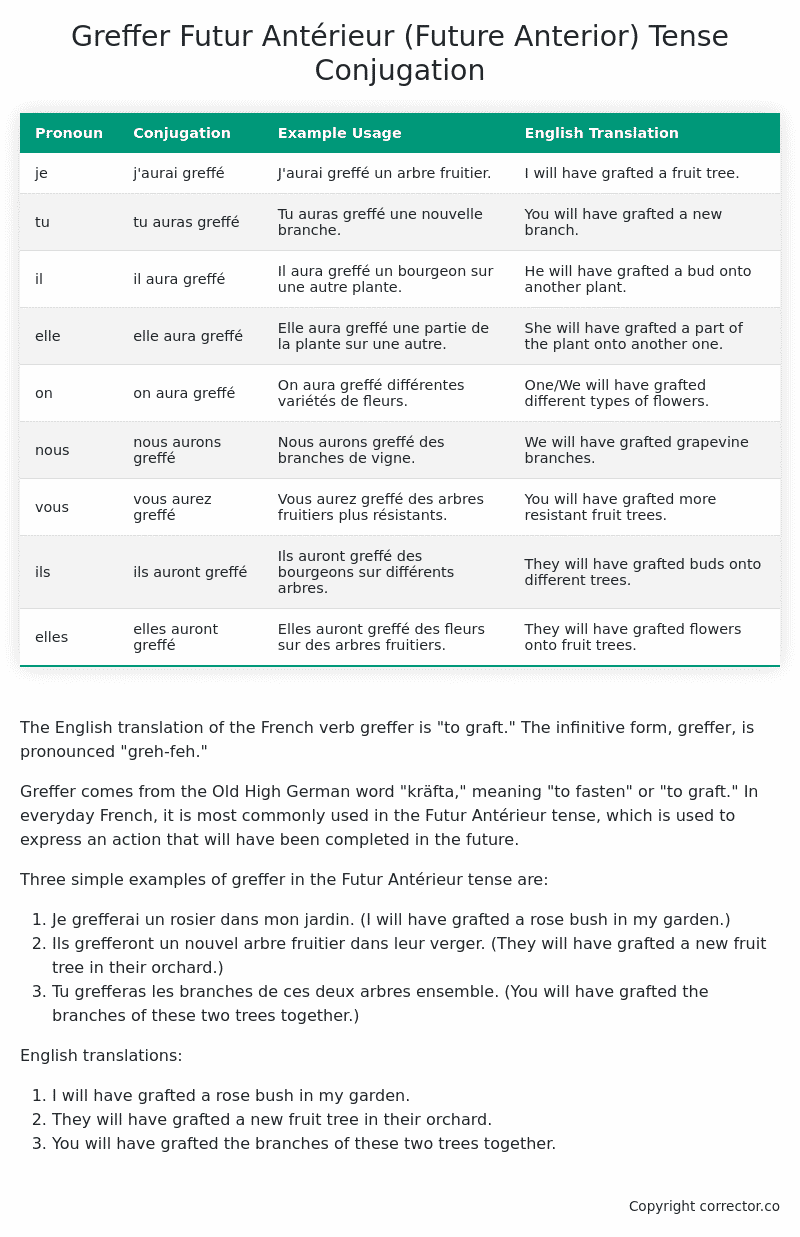Futur Antérieur (Future Anterior) Tense Conjugation of the French Verb greffer
Introduction to the verb greffer
The English translation of the French verb greffer is “to graft.” The infinitive form, greffer, is pronounced “greh-feh.”
Greffer comes from the Old High German word “kräfta,” meaning “to fasten” or “to graft.” In everyday French, it is most commonly used in the Futur Antérieur tense, which is used to express an action that will have been completed in the future.
Three simple examples of greffer in the Futur Antérieur tense are:
- Je grefferai un rosier dans mon jardin. (I will have grafted a rose bush in my garden.)
- Ils grefferont un nouvel arbre fruitier dans leur verger. (They will have grafted a new fruit tree in their orchard.)
- Tu grefferas les branches de ces deux arbres ensemble. (You will have grafted the branches of these two trees together.)
English translations:
- I will have grafted a rose bush in my garden.
- They will have grafted a new fruit tree in their orchard.
- You will have grafted the branches of these two trees together.
Table of the Futur Antérieur (Future Anterior) Tense Conjugation of greffer
| Pronoun | Conjugation | Example Usage | English Translation |
|---|---|---|---|
| je | j’aurai greffé | J’aurai greffé un arbre fruitier. | I will have grafted a fruit tree. |
| tu | tu auras greffé | Tu auras greffé une nouvelle branche. | You will have grafted a new branch. |
| il | il aura greffé | Il aura greffé un bourgeon sur une autre plante. | He will have grafted a bud onto another plant. |
| elle | elle aura greffé | Elle aura greffé une partie de la plante sur une autre. | She will have grafted a part of the plant onto another one. |
| on | on aura greffé | On aura greffé différentes variétés de fleurs. | One/We will have grafted different types of flowers. |
| nous | nous aurons greffé | Nous aurons greffé des branches de vigne. | We will have grafted grapevine branches. |
| vous | vous aurez greffé | Vous aurez greffé des arbres fruitiers plus résistants. | You will have grafted more resistant fruit trees. |
| ils | ils auront greffé | Ils auront greffé des bourgeons sur différents arbres. | They will have grafted buds onto different trees. |
| elles | elles auront greffé | Elles auront greffé des fleurs sur des arbres fruitiers. | They will have grafted flowers onto fruit trees. |
Other Conjugations for Greffer.
Le Present (Present Tense) Conjugation of the French Verb greffer
Imparfait (Imperfect) Tense Conjugation of the French Verb greffer
Passé Simple (Simple Past) Tense Conjugation of the French Verb greffer
Passé Composé (Present Perfect) Tense Conjugation of the French Verb greffer
Futur Simple (Simple Future) Tense Conjugation of the French Verb greffer
Futur Proche (Near Future) Tense Conjugation of the French Verb greffer
Plus-que-parfait (Pluperfect) Tense Conjugation of the French Verb greffer
Passé Antérieur (Past Anterior) Tense Conjugation of the French Verb greffer
Futur Antérieur (Future Anterior) Tense Conjugation of the French Verb greffer (this article)
Subjonctif Présent (Subjunctive Present) Tense Conjugation of the French Verb greffer
Subjonctif Passé (Subjunctive Past) Tense Conjugation of the French Verb greffer
Subjonctif Imparfait (Subjunctive Imperfect) Tense Conjugation of the French Verb greffer
Subjonctif Plus-que-parfait (Subjunctive Pluperfect) Tense Conjugation of the French Verb greffer
Conditionnel Présent (Conditional Present) Tense Conjugation of the French Verb greffer
Conditionnel Passé (Conditional Past) Tense Conjugation of the French Verb greffer
L’impératif Présent (Imperative Present) Tense Conjugation of the French Verb greffer
L’infinitif Présent (Infinitive Present) Tense Conjugation of the French Verb greffer
Struggling with French verbs or the language in general? Why not use our free French Grammar Checker – no registration required!
Get a FREE Download Study Sheet of this Conjugation 🔥
Simply right click the image below, click “save image” and get your free reference for the greffer Futur Antérieur tense conjugation!

Greffer – About the French Futur Antérieur (Future Anterior) Tense
Construction
Common Everyday Usage Patterns
Interactions with Other Tenses
For example
Summary
I hope you enjoyed this article on the verb greffer. Still in a learning mood? Check out another TOTALLY random French verb conjugation!


